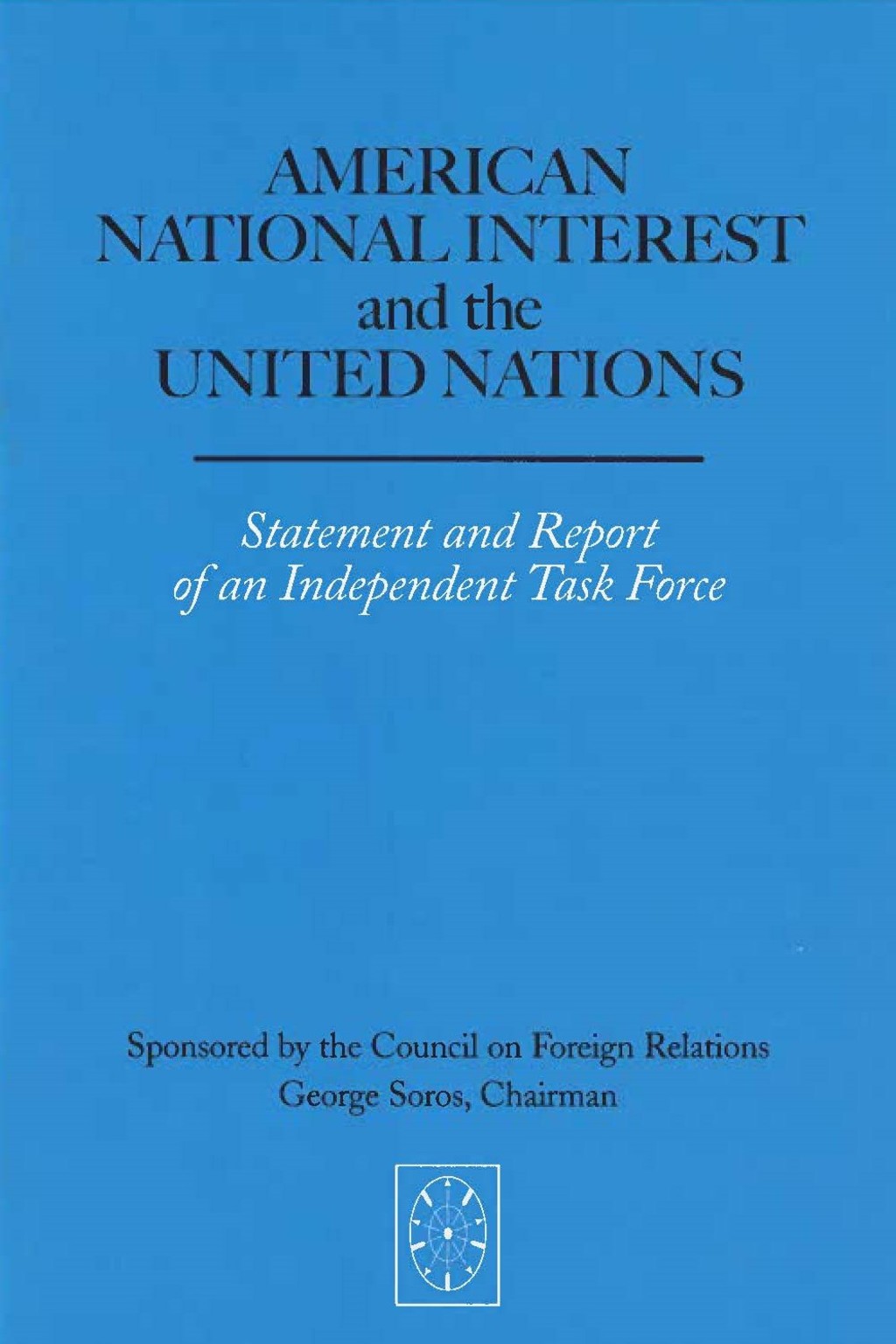Task Force Report No. #8
American National Interest and the United Nations
- George SorosCochair
What are Task Force Reports?
CFR sponsors Task Forces to assess issues of critical importance to U.S. foreign policy to reach bipartisan consensus on policy recommendations.
Who makes them?
Task Force members aim to reach a meaningful consensus on policy and are solely responsible for the content of their report.
This statement and report—the result of an expert nonpartisan Task Force including UN critics and advocates, Republicans and Democrats, liberals and conservatives—examine whether the United Nations has advanced or hindered the pursuit of U.S. interests in the last five years. It asks what changes within the UN will allow the United States to pursue its objectives more effectively. The report concludes that when the United States knows what it wants from the United Nations and takes the lead in getting it, the UN provides important assistance in advancing U.S. interests.
Task Force Members
FRANK C. RECORD: Mr. Record is a Senior Professional Staff Member of the House Committee on International Relations. Previously he served as Congressional Relations Officer at the Office of the General Counsel, Export-Import Bank.
ARTHUR ROSS: Mr. Ross is Vice Chairman and a member of the Executive Committee of the United Nations Association of the United States and a Governor of the Foreign Policy Association. He was a member of the U.S. delegation to the General Assembly and served as a member of the U.S. delegations to ECOSOC, UNESCO, and the U.N. Water Conference.
JOHN G. RUGGIE: Dr. Ruggie is Burgess Professor of Political Science and International Affairs at Columbia University, where he also served as Dean of the School of International and Public Affairs from 1991 to 1996.
BRUCE M. RUSSETT: Dr. Russett is Dean Acheson Professor of International Relations and Political Science and Director of United Nations Studies at Yale University. He is also Editor of the Journal of Conflict Resolution. His most recent books are Grasping the Democratic Peace: Principles for a Post-Cold War World and The Once and Future Security Council.
GEORGE SOROS: Mr. Soros, international philanthropist and financier, is Chairman of the Soros Foundations, a network of foundations operating in 25 countries throughout central and eastern Europe and the former Soviet Union as well as South Africa, Haiti, and the United States.
CYRUS R. VANCE: Mr. Vance is a partner in the law firm of Simpson Thacher & Bartlett. He served as Secretary of State in the Carter administration from 1977 to 1980.
WILLIAM J. VANDEN HEUVEL: Ambassador vanden Heuvel is Chairman of the Board of Governors of the United Nations Association of the United States. He is former Deputy Permanent Representative of the United States to the United Nations.
RUTH WEDGWOOD: Professor Wedgwood is Senior Fellow and Director of the Project on International Organizations and Law at the Council on Foreign Relations and Professor of Law at Yale Law School. She is a member of the Secretary of States Advisory Committee on International Law.
JOHN C. WHITEHEAD: Mr. Whitehead is Chairman of The Federal Reserve Bank of New York. He is former Chairman of Goldman, Sachs & Co. and former Deputy Secretary of State. He is Chairman of the United Nations Association of the United States.
RICHARD S. WILLIAMSON: Mr. Williamson is a partner in the international law firm of Mayer, Brown & Platt. He served as Assistant Secretary of State for International Organization Affairs and as Ambassador to the U.N. office in Vienna, Austria.
FAREED ZAKARIA: Dr. Zakaria is Managing Editor of Foreign Affairs. He previously ran the Project on the Changing Security Environment and American National Interests at Harvard University.






